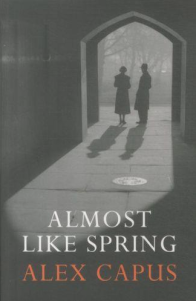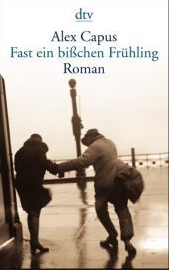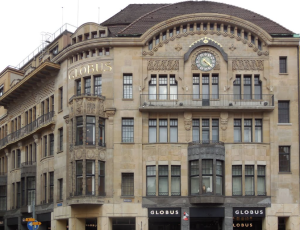

I wanted to post every other day during German Literature Month as I’ve read so many books in advance but last week was such an awful week. First the shocker election, then Leonard Cohen’s death, then the death of the brilliant Austrian writer Ilse Aichinger. So depressing. I’m sure many people feel the same way. Despondency may not be helpful but sometimes it needs room and needs to be acknowledge before we can move on.


I’ve not read any books by Alex Capus so far. I thought I wouldn’t like his writing but I’m glad to say, he’s so much better than I expected. I picked Almost Like Spring – Fast ein bisschen Frühling because it’s set in Basel, Switzerland. As many of you know, I live in Basel. There aren’t a lot of books set in this city, so I was curious because of that too.
As Capus writes at the beginning of his novel, Almost Like Spring tells the true story of the German bank robbers Kurt Sandweg and Waldemar Velte. Fleeing from Wuppertal, Germany after having robbed a bank and killed someone, they arrived in Basel in the winter of 33/34. The plan was to flee to India but one of them fell in love with a shop girl, Dorly Schupp, who was working in the record department where the two robbers bought Tango records. Dorly worked at Globus, a department store that still exists and is known because it’s one of the rare Jugendstil buildings in Basel.

Sandweg and Velte are depicted like two rebels and compared to Bonnie and Clyde. At any other time, one would have simply called them anti-social, but the way Capus depicts them, they were victims too. They robbed a bank because they were desperate, without a job and seeing no future in a Germany where the Nazis were taking over power. Sandweg and Velte are a peculiar pair; they are so close that people think they might be lovers but what they share is rather a bit like a folie à deux. In their heads, they’re on a mission – fighting poverty and injustice. One of them falls in love with Dorly, the other one with one of her colleagues— Alex Capus own grandmother. While the pair is in Basel, they buy a Tango record every day and go for long walks through the old town and along the Rhine, accompanied by the two young women.
The descriptions of these walks are lovely. The way Capus describes the weather, the cold winds from Siberia, and how it can get warm again, all of a sudden, in the middle of winter, because those winds change course and warm winds from the south arrive, is so spot on. The four young people don’t do much on these walks, but all four of them feel free. Dorly lives with her elderly mother, while Capus’ grandmother is engaged and will soon marry a man she never really liked. The two women don’t know that the men are criminals and when they finally leave Basel, they are disappointed.
Unfortunately, the plan to take a ship to India doesn’t work and a couple of weeks later, after having stayed in Spain, the two men are back in Basel and the real tragedy begins. They rob another bank, kill people, and are hunted down.
Most critics haven’t found anything good to say about this novel. I’m not sure why. Is it the tone? Capus mixes fact and fiction. He stays outside of his character’s heads, which makes it sound like a report at times, but the book is rich in mood and atmosphere. He captures the times and women’s fates so well. What choices did they have back then? Dorly’s actually living a relatively independent life, but Capus’ grandmother, who isn’t from Basel, is expected to return home soon and get married. While the storytelling is a bit dry, the mood is anything but.
I’m not sure about the descriptions though. Readers who haven’t been to Basel may be able to picture the department store Globus but the city? I don’t think so because he mentions street names but doesn’t really describe them.
Be it as it may, sometimes I agree with critics, sometimes I don’t. In this case I don’t agree. Almost Like Spring is a lovely book. It’s a rounded, historically accurate, atmospheric book that mixes fact and fiction to great effect.
